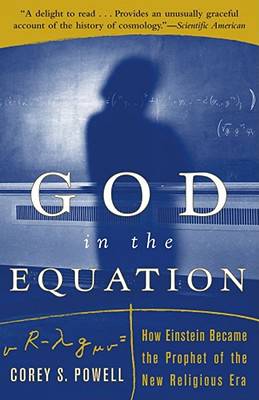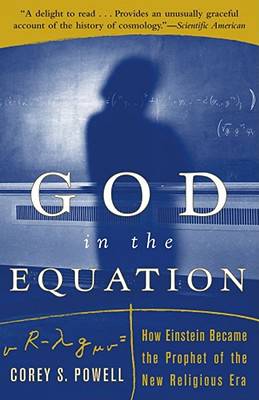
- Afhalen na 1 uur in een winkel met voorraad
- Gratis thuislevering in België vanaf € 30
- Ruim aanbod met 7 miljoen producten
- Afhalen na 1 uur in een winkel met voorraad
- Gratis thuislevering in België vanaf € 30
- Ruim aanbod met 7 miljoen producten
Zoeken
€ 28,45
+ 56 punten
Omschrijving
He wanted to know where our world comes from and where it was going.
He wanted to understand how the remote stillness of the heavens relates to the erratic, ever-changing events here on earth.
Above all, he wanted to know if the answers to these questions would bring him closer to a higher authority.
So Einstein put God in the Equation
"Everyone who is seriously involved in the pursuit of science," Albert Einstein once said, "becomes convinced that a spirit is manifest in the laws of the universe -- a spirit vastly superior to that of man." This mysterious component, which Einstein called a "cosmological constant," would eventually work its way into his world-shattering theory of relativity. In this way, explains acclaimed science writer Corey S. Powell, Einstein was creating a formula for a new kind of "sci/religion," one in which God was a factor, denoted by the Greek letter Lambda, and one that would pave the way for an entirely new gnostic era in the history of human spirituality.
He wanted to understand how the remote stillness of the heavens relates to the erratic, ever-changing events here on earth.
Above all, he wanted to know if the answers to these questions would bring him closer to a higher authority.
So Einstein put God in the Equation
"Everyone who is seriously involved in the pursuit of science," Albert Einstein once said, "becomes convinced that a spirit is manifest in the laws of the universe -- a spirit vastly superior to that of man." This mysterious component, which Einstein called a "cosmological constant," would eventually work its way into his world-shattering theory of relativity. In this way, explains acclaimed science writer Corey S. Powell, Einstein was creating a formula for a new kind of "sci/religion," one in which God was a factor, denoted by the Greek letter Lambda, and one that would pave the way for an entirely new gnostic era in the history of human spirituality.
Specificaties
Betrokkenen
- Auteur(s):
- Uitgeverij:
Inhoud
- Aantal bladzijden:
- 288
- Taal:
- Engels
Eigenschappen
- Productcode (EAN):
- 9780684863498
- Verschijningsdatum:
- 12/08/2003
- Uitvoering:
- Paperback
- Formaat:
- Trade paperback (VS)
- Afmetingen:
- 162 mm x 213 mm
- Gewicht:
- 258 g

Alleen bij Standaard Boekhandel
+ 56 punten op je klantenkaart van Standaard Boekhandel
Beoordelingen
We publiceren alleen reviews die voldoen aan de voorwaarden voor reviews. Bekijk onze voorwaarden voor reviews.








